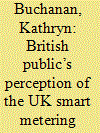| Srl | Item |
| 1 |
ID:
150863


|
|
|
|
|
| Summary/Abstract |
Consumer acceptance of smart meters remains crucial in achieving the potential carbon emission reductions offered by advanced metering infrastructures. Given this, the present research used deliberative focus groups to examine what is needed to secure acceptance and engagement from domestic consumers with services, products and ‘offers’ in smarter power systems. Our findings suggest that consumers are able to identify not just threats relating to smart metering initiatives but opportunities as well. In particular, our focus group participants responded positively to the idea of an automated system that could be used to achieve energy savings in combination with time-of-use tariffs. We conclude by outlining suggestions for policy recommendations that may help consumer acceptance of smart meter enabled services be more readily achieved.
|
|
|
|
|
|
|
|
|
|
|
|
|
|
|
|
| 2 |
ID:
137688


|
|
|
|
|
| Summary/Abstract |
With smart metering initiatives gaining increasing global popularity, the present paper seeks to challenge the increasingly entrenched view that providing householders with feedback about their energy usage, via an in-home-display, will lead them to substantially reduce their energy consumption. Specifically, we draw on existing quantitative and qualitative evidence to outline three key problems with feedback, namely: (a) the limited evidence of efficacy, (b) the need for user engagement, and (c) the potential for unintended consequences. We conclude by noting that, in their current form, existing in-home-displays may not induce the desired energy-reduction response anticipated by smart metering initiatives. Instead, if smart metering is to effectively reduce energy consumption there is a clear need to develop and test innovative new feedback devices that have been designed with user engagement in mind.
|
|
|
|
|
|
|
|
|
|
|
|
|
|
|
|